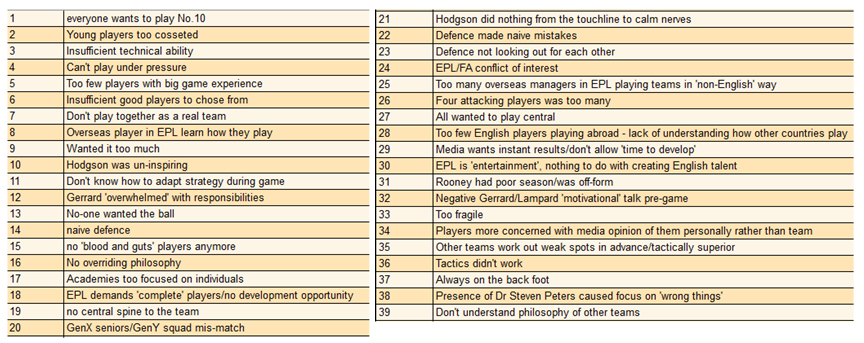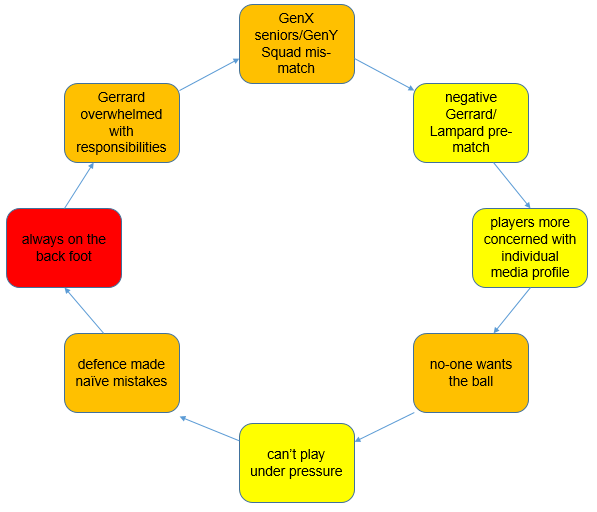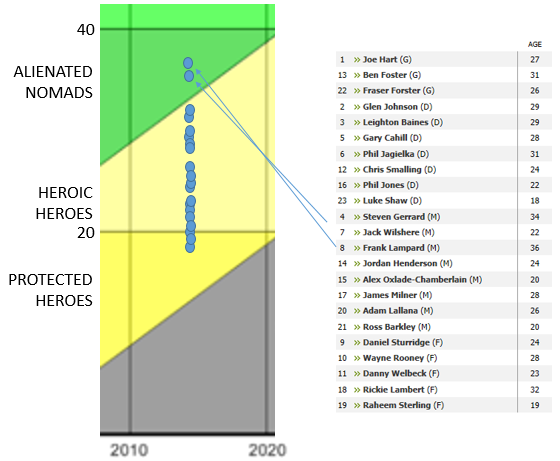 “It could be a terrible long, frustrating summer if we don’t get it right on Thursday,’’ Gerrard told the players. He underlined the significance of these 90 minutes. “There is no hiding place for a player when you go out of a tournament. You go home earlier than you expect. It can be tough as a player and it can take an awful long time to get over it. A lot of people know that in the dressing room but a few young lads – it was important for them to realise what is at stake and how important this game is. We all need to leave everything on that pitch. If a defeat was to happen it is probably the most difficult place to be in as a footballer.
“It could be a terrible long, frustrating summer if we don’t get it right on Thursday,’’ Gerrard told the players. He underlined the significance of these 90 minutes. “There is no hiding place for a player when you go out of a tournament. You go home earlier than you expect. It can be tough as a player and it can take an awful long time to get over it. A lot of people know that in the dressing room but a few young lads – it was important for them to realise what is at stake and how important this game is. We all need to leave everything on that pitch. If a defeat was to happen it is probably the most difficult place to be in as a footballer.
“I’ve been there. I’ve had that feeling. So I know what that feeling is about and that is the feeling that I don’t want to come Friday morning. But it wasn’t a message to scare any of the lads but a wake-up call to everyone in the room, staff, players. Me and Frank have been there and done it so I suppose our experience at times is very important in the dressing-room. It wasn’t to scare anyone or intimidate anyone but that is the reality of where we are and we need everyone focused and right on it to perform individually and collectively on Thursday otherwise it will be a terrible long summer.”
England Captain, Steven Gerrard, interview before the Uruguay game
World Cup fervor was somewhat short-lived in England this summer when England’s campaign fizzled out after less than six days. Not since 1958 has the team done so badly. Not surprisingly, every footballing pundit in the country was asked by the media to express their views about what caused the trio of dismal performances by the team. Everyone, from the manager to the players to ex-players to the ‘man on the street’ had an opinion. Nearly all appeared to have it figured out quite clearly. The only problem was, everyone had a different opinion.
And – worse – everyone, as is so often the case in these post-trauma, soul-searching activities, was operating under the illusion that it was possible to isolate the failure of the team down to a single ‘root cause’ reason. Meaning that the poor old viewer or radio listener was subjected to hour after hour of meaningless, ‘yes it was, no it wasn’t’ debate, that ultimately left no-one any clearer than they were at the beginning. To repeat something we find ourselves saying a lot, ‘there is no such thing as a root cause in a complex problem’. Complex problems are the emergent outcome of a conspiracy of causes.
The best way to untangle what that conspiracy of causes might be is to take all of the different opinions and use the Perception Mapping process to map the relationships between each of them. So, in the interests of national well-being, that’s what we set about doing. Here’s what we found.
First up, here are all of the different reasons we were able to glean from the tera-bytes of media coverage that’s emerged since the initial defeat against Italy in the first game of the campaign. In all we found 39 different perception statements:
The next part of the process involved mapping the relationships between each of these perceptions. The key to doing this in a meaningful way is answering the question, ‘which of the other perceptions does this one lead to?’ In situations where a perception potentially leads to several other perceptions, the process requires us to choose the perception that is lead to first.
The following perception map illustrates the overall result of completing this leads-to analysis for the 39 different cited reasons. The map helps to reveal the ‘conspiracy of causes’ by highlighting loops and collectors. The loops in particular represent the most important part of a conspiracy – being, in effect, the downward spirals or ‘vicious circles’ that inevitably emerge in systems of all kinds.
The picture reveals one big loop. The good news this reveals is that the England failure has a single overall conspiracy of causes. The bad news is that when we zoom in and look at the details of what’s happening in the loop, we see that it contains many elements that are ‘non-trivial’:
Before getting in to some of the details of the loop, however, it is also worth noting another, less well known aspect of perception maps. The reason we are able to say that there is no such thing as a single root cause in any complex problem is that anything on the periphery of the map is in effect a root cause. All of these ‘peripheral’ perceptions have been placed at the top of the main perception map image. Thus perceptions 25, 24, 38, 15, 29, 3, 27 and 10 might all be legitimately described as ‘root causes’ of the England team failure.
The problem with multiple ‘root causes’ is simply that there are lots of them. There’s no option to just work on one or two since it is the combination that is driving the behavior of the system. Far better, according to our last fifteen years’ experience of constructing and using these maps to focus on the vicious circle and try and somehow try and break it. Possibly, for those new to the Perception Mapping process, taking account of the ‘collectors’ (perception statements that have multiple ‘leads-to’ arrows pointing to them) that are leading in to the main loop. In this case the main collector can be seen as perception statement 7, ‘not playing together as a real team’. We often describe these collectors as accelerators of the downward spiral. It is always useful to be cognizant of their presence, but ultimately, it’s the downward spiral that we need to focus our attention towards.
When looking at these loops for possible solution strategies, it is often the case that some of the perception statements are more actionable than others. Some of them require long term strategies to resolve. Others, on the other hand, are amenable to a much more rapid solution. Looking at the loop close-up picture suggests to us that the heart of this problem has its foundations in a generational problem. Namely the fact that the two most senior players – Steven Gerrard and Frank Lampard – are of a different generation to the rest of the squad (see next figure). While this might not have been a problem in its own right, the Alienated Nomad version of a pre-match motivational talk to the other players and what the Heroic Hero and Protected Hero players would actually be motivated by were a considerable distance apart. While there can be no doubt neither Gerrard or Lampard had any intent to cause a problem, much of what they said, when listened to through Hero ears, would most likely be interpreted as ‘this is not going to go well, look after yourself’.
The good news for forward-thinking England supporters is that in two years’ time, when the next big competition comes along, this generational mis-match problem will have solved itself. Gerrard and Lampard’s retirement from the squad, in other words, will be a good thing… irrespective of the prodigious playing talents of both players.
The bad news is, when we remove them from the overall perception map gives us a much more insidious downward spiral that will involve the Hero generation players having to tackle some difficult personal questions. But that’s another story. In the meantime, we can at least say we understand what’s gone wrong this time, that it will be a different set of problems next time and that – most important of all – we have a process for reliably working out what they are and for really getting to grips with them.




